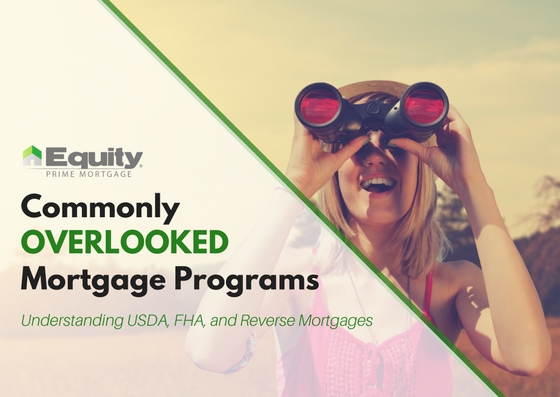Commonly Overlooked Mortgage Programs
Posted by Christine Moore on

Mortgage Loans, USDA Loans, Reverse Mortgages
Purchasing a new home can seem complex when there are several conventional home loans on the market to consider. However, there are a few options for mortgage loans that future homeowners often overlook, including USDA loans and reverse mortgages from reverse mortgage lenders. These programs were designed to boost the economy by offering affordable down payment options, including zero down payments. But it's vital for potential homeowners to consider the option that suits their needs. Here are a few aspects to consider:
USDA Rural Loans and FHA Loans
To boost the economy, the U.S. Department of Agriculture began distributing loans for eligible suburban and rural home buyers in 1991 through the USDA Rural Development Guaranteed Housing Loan Program. Economic reasons also prompted Federal Housing Administration or FHA loans from Atlanta mortgage lenders and other U.S. mortgage lending companies in 1934. Yet, many potential home buyers don't leverage these home loan programs. As of 2014, 140,000 individuals used a USDA rural loan to either buy or refinance their homes. This is much lower than the 5.98 million total originated conventional mortgage loans. However, USDA rural loan originations have since increased. USDA rural loans and FHA loans offer no-money down or low down payments, including direct loans and guaranteed loans. Still, income, the occupants and the location are vital requirements in determining loan and down payment eligibility.
Reverse Mortgages
Although reverse mortgages are frequently positioned as income-earning vehicles via equity from a homeowner's existing residence, it's also possible to use a reverse mortgage loan to buy a new home. Reverse mortgages helped finance only 40,000 homes in 2014, which indicates that this mortgage option is being overlooked. Age makes a difference, too. As of 2017, homeowners must be at least 62 years of age to qualify for a reverse mortgage. A reverse mortgage loan tends to provide more buying power the older the borrower is because it is based on the home's value. There is no repayment of the loan until the home is sold or the borrower dies. It's also important to note that there are limitations to the types of homes that can be purchased with reverse mortgages, such as single family homes and HUD-approved condominiums.
Final Thoughts
USDA loans, FHA loans, and reverse mortgages are viable options to finance new home purchases. But, potential homeowners should consult an approved mortgage lender, such as Equity Prime Mortgage. Approved lenders have the experience and training necessary to assist with various loan processing services, including help with applying for a Reverse Mortgage.



